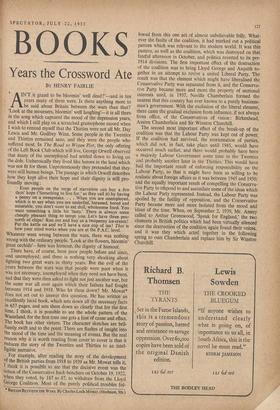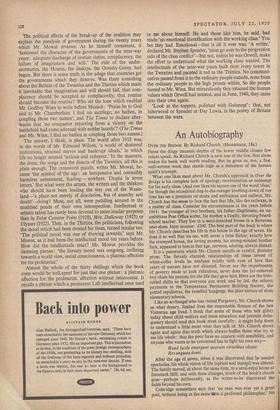BOOKS
Years the Crossword Ate
BY HENRY FAIRLIE 1N'T it grand to be bloomin' well dead?'—and in ten years many of them were. Is there anything more to be said about Britain between the wars than that? `Look at the mourners, bloomin' well laughing'—it is all there in the song which captured the mood of the depression years, and which I still play on a scratched gramophone record when I wish to remind myself that the Thirties were not all Mr. Day Lewis and Mr. Godfrey Winn. Some people in the Twenties and Thirties remained sane, and they were the people who suffered most. In The Road to Wigan Pier, the only offering of the Left Book Club which will live, George Orwell observed that many of the unemployed had settled down to living oil the dole. Unheroically they lived like heroes in the land which was not fit for them. Unpretentiously they pretended that they were still human beings. The passage in which Orwell describes how they kept alive their hope and their dignity is still pro- foundly moving : Even people on the verge of starvation can buy a few days' hope ('Something to live for,' as they call it) by having a penny on a sweepstake. . , . When you are unemployed, which is to say when you are underfed, harassed, bored and miserable, you don't want to eat dull, wholesome food. You want something a little bit 'tasty.' There is always some cheaply pleasant thing to tempt you. Let's have three pen north of chips! Run out and buy us a twopenny ice-cream! Put the kettle on and we'll have a nice cup of tea 1 That is how your mind works when you are at the P.A.C. level.
Whatever went wrong between the wars, there was nothing wrong with the ordinary people. 'Look at the flowers, bloomin' great orchids'—here was Inimour, the dignity of humouf.
There have, of course, been poor people before and since, and unemployed; and there is nothing very shocking about lighting two great wars. in thirty years. But the evil of the Years between the wars was that people were poor when it was not necessary, unemployed when they need not have been, and that they were then asked to fight not just another war, but the same war all over again which their fathers had fought between 1914 and 1918. Who let them down? Mr. Mowat* does not set out to answer this question. He has written an excellently lucid book, which sets down all the necessary facts in 657 pages, and sets them down so clearly that for the first time, I think, it is possible to see the whole pattern of the Wasteland, for the first time one gets a hint of cause and effect. The book has other virtues. The character sketches are bril- liantly, swift and to the point. There are flashes of insight into the mood of the time and the 'meaning of events. But the real reason why it is worth reading from cover to cover is that it reduces the story of the Twenties and Thirties to an intel- ligible narrative.
For example, after reading the story of the development of the British parties from 1918 to 1939 as Mr. Mowat tells it, I think it is possible to see that the decisive event was the action of the Conservative back-benchers on October 19, 1922, when they voted, by 187 to 87, to withdraw from the Lloyd George Coalition. Most of the purely political troubles fol- ._
* BRITAIN BETWEEN 'THE WARS. By Charles Loch Mowat. (Methuen, 30s.)
lowed from this one act , of almost unbelievable folly. What- ever the faults of the coalition, it had marked out a political pattern which was relevant to the modern world. It was this pattern, as well as the coalition, which was destroyed on that, fateful afternoon in October, and politics reverted to its pre- 1914 divisions. The first important effect of the destruction of the coalition was to bring Lloyd George and Asquith to- gether in an attempt to revive a united Liberal Party. The result was that the element which might have liberalised the Conservative Party was separated from it, and the Conserva- tive Party became more and more the property of sectional interests until, in 1937, Neville Chamberlain formed the nearest that this country has ever known to a purely business- man's government. With the exclusion of the liberal element, there came the gradual exclusion from influence, if not always from office, of the Conservatives of vision : Birkenhead, Austen Chamberlain and Sir Winston Churchill.
The second most important effect of the break-up of the coalition was that the Labour Party was kept out of power. If the coalition had survived, the reorientation of parties, which did not, in fact, take place until 1945, would have occurred much earlier, and there would probably have been a majority Labour Government some time in the Twenties and probably another later in the Thirties. This would have had the important result of enforcing responsibility on the Labour Party, so that it might have been as willing to be realistic about foreign affairs as it was between 1945 and 1950; and the equally important result of compelling the Conserva- tive Party to respond to and assimilate some of the ideas which the Labour Party represented. Instead, the Labour Party was spoiled by the futility of opposition, and the Conservative Party became more and more isolated from the mood and ideas of the time. When, on September 2, 1939, Mr. Amery called to Arthur Greenwood', !Speak for England,' the two elements in British politics which had been virtually silenced' since the destruction of the coalition again found their voices, and it was they which acted together in the following spring to oust Chamberlain and replace him by Sir Winston Churchill. The political effects of the break-up of the coalition may explain the paralysis of government during the twenty years which Mr. Mowat reviews. As he himself comments, it 'fashioned the character of the governments of the inter-war years : adequate discharge of routine duties, complacency, the failure of imagination and will.' The rule of the under- secretaries, the Hoares, the Inskips, the Ormsby-Gores, had begun. But there is some truth in the adage that countries get the governments which they deserve. Was there something about the Britain of the Twenties and the Thirties which made it inevitable that imagination and will should fail, that com- placency should be accepted so complacently, that routine should become the routine? Who set the tone which enabled Mr. Godfrey Winn to write before Munich : 'Praise be to God and to Mr. Chamberlain. I find no sacrilege, no bathos, in coupling those two names'; and The Times to declare after- wards that 'no conqueror returning from a victory on the battlefield had come adorned with nobler laurels'? (The Times and Mr. Winn; I find no bathos in coupling those two names.) The answer, I think, is plain. The world after 1918 was, in the words of Mr. Edmund Wilson, 'a world of shattered institutions, strained nerves and bankrupt ideals,' in which life no longer seemed 'serious and coherent.' In the manners, the dress, the songs and the dances of the Twenties, all this is plain enough. The crossword puzzle, writes Mr. Mowat, be- came 'the symbol of the age : an inexpensive and ostensibly harmless amusement, leading — nowhere. Utopia in seven letters.' But what were the artists, the writers and the thinkers who should have been leading the way out of the Waste- land—'a place not merely of desolation, but of anarchy and doubt'—doing? Most, not all, were paddling around in the muddied ponds of their own introspection. Intellectual or artistic talent has rarely been devoted to more insular purposes than in Point Counter Point (1928), Mrs. Dalloway (1925) or Ulysses (1922). Then, in the Thirties, the politicians, following the mood which had been created for them, turned insular too. 'The political mood was one of drawing inwards,' says Mr. Mowat, as it had been-the intellectual mood ten years before. How did the intellectuals react? Mr. Mowat provides the damning phrase : 'the literary mood was outgoing, inclining towards a world view, social consciousness, a platonic affection for the proletariat.'
Almost the whole of the thirty shillings which the book costs would be well, spent for just that one phrase : a platonic affection for the proletariat, affection without intercourse. It recalls a phrase which a prominent Left intellectual once used to me about himself. He and those like him, he said, had made 'an emotional identification with the working class.' You bet they had. Emotional—that is all it ever was.• 'A writer,' declared Mr. Stephen Spender, 'must go over to the progressive side of the class conflict'—but not, unless he was Orwell, make the effort to understand what the working class wanted. The intellectuals of the inter-war years built their ivory tower in the Twenties and painted it red in the Thirties. No communi- cation passed from it to the ordinary people outside, none from the ordinary people to the high priests within. So the people turned to Mr. Winn. But miraculously they retained the human values which Orwell had noticed, and in June, 1940, they came into their own again.
'Look at the toppers, polished with Guinnep' : that, not Isherwood or Spender or Day Lewis, is the poetry of Britain between the wars.



















































 Previous page
Previous page